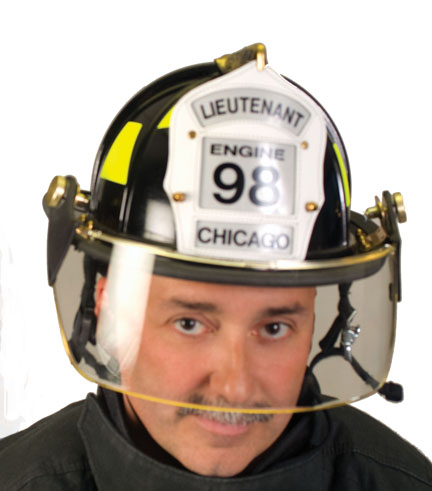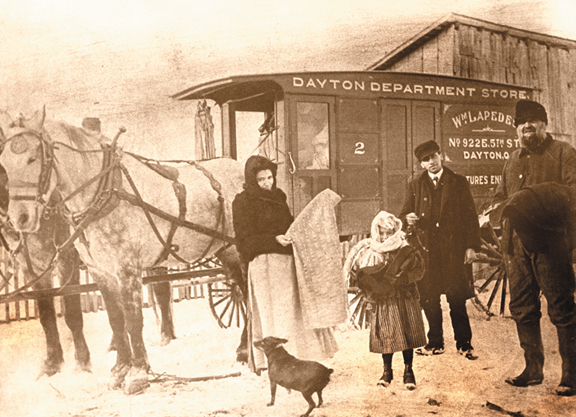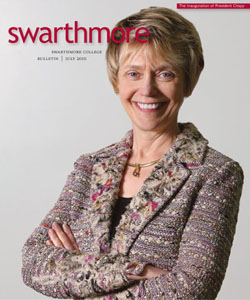Ready to Serve
This is not your great-grandfather’s fire-fighting gear.

“Readiness has to do with making sure our customers are ready to do their jobs—and all of our customers are either in the military or are first responders,” Schwartz says.
“TWENTY YEARS AGO, WE WERE MOSTLY CONCERNED ABOUT FIRE AND WATER,” says Steve Schwartz ’84, CEO of Lion Apparel, a Dayton, Ohio–based uniform company started by Schwartz’s great-grandfather in 1898.
“That grew into a greater concern about industrial chemicals and blood-borne protection, and today it has evolved further into CBRN [chemical, biological, radiological, and nuclear] protection.” One of Lion’s new products, the Janesville CB-XiT, is a fire-fighting suit designed to protect first responders as they escape from heat, moisture, or chemical or biological agents. In today’s world, there are more threats to protect yourself against.
As the world has grown increasingly complex, Lion Apparel has also evolved, from a clothing and dry-goods shop into a supplier of uniforms for service station workers into, today, a global (but still family-owned) company that outfits police and fire department first responders and members of the military. According to Schwartz, Lion’s annual revenue exceeds $100 million (he declined to give a more specific figure) and its clients include city fire-fighting departments in Baltimore, Chicago, Dallas, Houston, Philadelphia, Portland, San Diego, San Francisco, and Seattle as well as fire-fighting companies in Canada and overseas.
In addition to producing, repairing, and cleaning protective uniforms for firefighters, Lion provides the same type of service for military personnel. The company has contracts to operate equipment logistics centers on four U.S. Marine Corps bases: Camp Kaneohe Bay, Hawaii; Camp Kinser, Okinawa, Japan; Camp Lejeune, North Carolina; and Camp Pendleton, California. On these bases, Lion manages the lifecycle of clothing and equipment, manages stores (or, in military speak, “individual issue facilities”) where Marines outfit themselves, and maintains databases tracking who has received what—in other words, “who’s ready to do what job.”
“We fulfill the personal safety, readiness, and identity needs of our customers,” says Schwartz, citing the company’s mission statement. “Readiness has to do with making sure our customers are ready to do their jobs—and all of our customers are either in the military or are first responders, so being ready to do their jobs is a very important and serious matter.
“The personal safety element of our mission refers to the protection we’re providing them to do their jobs. We have to be very serious about quality and serious about trying to find the most innovative products and materials to increase that level of safety, because it’s a matter of life and death.”

Lion employee Doug Plyman models the company’s Janesville Turnout Gear worn by members of the Chicago Fire Department.
SCHWARTZ'S CONNECTION TO THE UNIFORM BUSINESS IS MATRILINEAL—his mother’s grandfather, William Lapedes, is Lion’s founder. Schwartz’s mother was not involved in the company, and he grew up in Cincinnati, about a half mile from where he lives today. At Swarthmore, he studied engineering— “I specifically picked Swarthmore, because I enjoyed the idea of being an engineer but I also wanted to get a great liberal arts education.” He was station manager for WSRN and, as a member of Phi Psi,
managed the fraternity’s refrigerator rental business.
It was through a Swarthmore connection that Schwartz launched his career in business. “The first day I arrived at Swarthmore and met my fourth-floor roommate in Parrish, Salem Shuchman ['84], his family adopted me as one of theirs,” says Schwartz. Four years later, Schwartz joined Salem’s older brother, Matt, in starting a computer consulting company in New York. This was 1984—early days for personal computers. In his adopted family business (which no longer exists), “We were installing what were then very exotic and complicated things called local area networks and teaching people how to use PCs,” Schwartz recalls. “I did that for three-and-a-half years, learned how—as I said on my business school application—not to run a business, and went to Northwestern [University] to figure out the right way to do it.”
Upon graduating from Northwestern with a master’s in management in 1989, Schwartz joined Lion, the family business. He began in the client services unit, providing reports on the company’s performance to customers, then moved into leadership positions in sales before becoming chief operating officer and, in 2006, chief executive officer. Schwartz’s brother, Andrew, is corporate counsel.
Schwartz is married to Melissa Kotler Schwartz. They have two children, Olivia, 14, and Sam, 10.
“I’m secretly hoping that one of them will go to Swarthmore.”
FIRST, AS COO, AND, NOW, AS CEO, Schwartz has been a key figure in orchestrating Lion’s overseas expansion. Lion now operates in seven countries and has joint ventures with companies in Germany, New Zealand, and Spain. Among Lion’s international clients are the Hong Kong Fire Brigade; the National Fire Services of Chile and Ghana, respectively; and the Saudi Arabian National Civil Defense Fire Service. Through its joint venture with Germany’s Hellmann Worldwide Logistics, Lion has a contract to outfit nearly a million German soldiers and reservists.
Schwartz reports that Lion has about 750 employees in the United States and another 500 or so globally. Lion operates its own factories in Kentucky; Ohio; and Ontario, Canada, and contracts with factories in the Caribbean Basin, China, and Eastern Europe. “We take the use of contractors very seriously, and we screen them and monitor them very closely to ensure that they are using proper practices with their employees,” Schwartz says.
Nonetheless, like many companies in the apparel industry, Lion has periodically faced criticism of its labor practices. Although none of Lion’s American factories are currently unionized, Schwartz says that the company is “proud of all aspects of the working conditions in our facilities. We believe that direct collaboration with our employees gives us more flexibility than working through a third party. The cost structure and inflexibility of a union environment is economically prohibitive in our industry.”
In October 2009, the Worker Rights Consortium (WRC) released a report detailing substandard labor practices at factories producing uniforms for nine U.S. companies, including a Lion contractor in Honduras. The WRC, which was conducting the review on behalf of the City of Los Angeles, documented instances of underpayment of workers and gender discrimination (female workers testified that the factory conducted mandatory pregnancy tests). Lion disputed some of the specific charges—including the alleged pregnancy testing—but took action in most areas. Indeed, in a subsequent factory inspection, the monitors found significant progress, although they noted that “further remediation was still necessary.”

The firm that became Lion Apparel was started 112 years ago by CEO Steve Schwartz's great-grandfather, William Lapedes, a Latvian immigrant. The company's first asset was this wagon, from which Lapedes and family sold dry goods and clothing around the Dayton, Ohio, area. It is still a family-run business with William's grandson Richard Lapedes as chairman of the board and Schwartz’s brother Andrew as corporate counsel.
“We took the allegations extremely seriously,” Schwartz says, “and responded as aggressively as we could. We will continue to be diligent in responding to issues as they come up.”
Schwartz credits Swarthmore with helping cultivate the agility, curiosity, and critical thinking he’s needed to succeed in business. “You can’t ever rest on the fact that your company is 100 years old or that you have a leading market position, because the market doesn’t really care about how old you are. They care about what you do for them today.”
That’s how Schwartz, using what he calls “my Swarthmore-developed engineering instinct,” has led the company to be the industry leader in the development of innovative new products.
He cites the patented ISODri system for firefighter turnout gear as the most dramatic example and the one that gives him the most pride. It is made with a system of water resistant and flame resistant materials that keeps the firefighter safer and drier, reducing the risk of serious burn injury. “After wetting it and putting it under a heat load, the standard system of materials reaches first-degree burn temperature within 30 seconds, but our ISOdri system remains far below that temperature level even after two minutes,” Schwartz says.
Looking ahead, he says he “expects to continue to lead Lion on the trajectory it’s on now”—again, per the company’s mission statement, fulfilling the “personal safety, readiness, and identity needs” of firefighters, police officers, and members of the military.
“I feel very good about our mission—and that there’s a lot of room to grow within that mission.”
Elizabeth Redden is a freelance writer based in New York.
 Email This Page
Email This Page